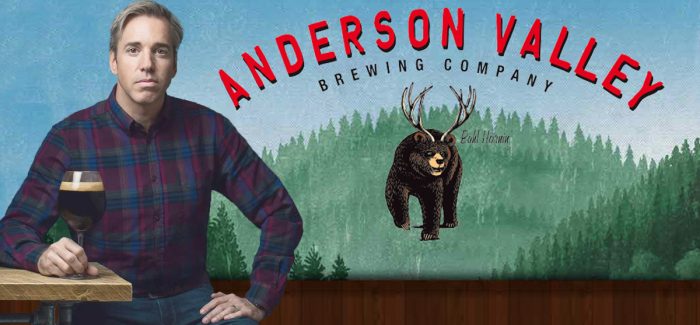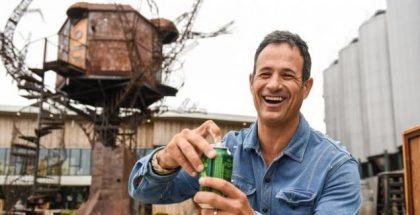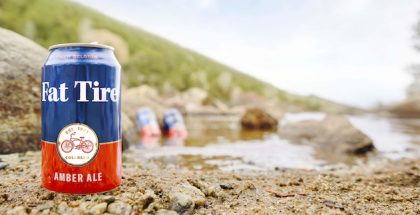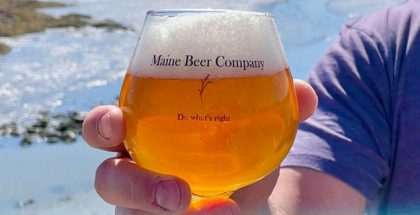5 Questions with Kevin McGee, Anderson Valley Brewing Co.
Now in its fourth decade, Anderson Valley Brewing Company (AVBC) is now owned by the McGee family, namely Kevin McGee, an attorney who previously opened the one-barrel, nano brewery called Healdsburg Beer Company (out of his garage). Although buying an “OG” craft brewery just in time for a global pandemic was not ideal, AVBC has managed to not only survive, but do well. It helps that AVBC beer remains in the hands of the well-respected, longtime brewmaster (and author) Fal Allen. Under his direction, the brewery continues to produce its famed Gose series, run a laudable barrel program and offer a slew of “regular” beers such as its Boont Amber Ale. The beer is produced in part with power from the sun, as roughly 40% of the brewery’s power is solar (and soon to be 100%). And why not? When you can look outside your brewery and view gorgeous scenery, you might feel inspired to protect the planet that provides it.
We wanted to know a bit more about Anderson Valley so we asked Kevin McGee, owner and CEO of AVBC, five questions about the brewery and its beer.
AVBC is one of the OG breweries, emerging at a time when hoppy beers ruled the Craft Beer world. Yet, you now brew beers like Black Rice Ale. What is the story behind that unique beer?
The story of the Black Rice Ale is one of serendipity. Fal was cooking with it one day and it struck him that it could be really compelling to brew with it. There was plenty of trial and error due to the grain’s unique properties and black rice behaves differently than the white rice used in some beers because it’s more glutenous. The team was looking to extract flavor and color, not traditional sugars, so they eventually struck upon dialing in some specific mash temperatures for extraction and a different boil schedule. This ultimately resulted in capturing the dark, umami flavors from the rice without overly extracting starches and other components. This became the Black Rice Ale, which, as a bonus, also ended up at 90 calories practically by accident.
View this post on Instagram
While you certainly have plenty of innovative beers and a strong barrel program, you still offer–and distribute–plenty of recognizable/traditional styles. Is there any worry that selling “non-trendy” beers is going to be tougher as time goes on?
Not at all – in fact, we are very excited to be championing beer-flavored-beers and traditional styles these days. Humans have been drinking beer for thousands of years and the so-called traditional styles became the traditional styles because they’re really good. We will always have an active R&D program and we like to have fun and tinker around with new products, but our foundational beers will always be at the core of what we do here and it’s the strength of that core that gives us “permission” to stretch out and do new things. We will always be innovating and improving and releasing new beers, but we don’t look to jump on trendy or in-the-moment beers mostly because we have a long-term business perspective and that perspective doesn’t fit well with a “churn the shiny object” marketing strategy. The trendy beers get attention because they’re dynamic and are something to comment on if you’re in the industry, but mostly the growth statistics they drive are off a small base and when they’re looked at in the context of the larger beer categories, they’re just not that impactful and worse, they lead to a cycle of constantly trying to chase niche fashion. That can be exhausting and is also a really fragile business model. If you consistently make really good beer, you don’t have to chase the trends – our Boont Amber was the very first brew at AVBC in 1987 and continues to be our most popular beer. We’d rather focus on making world-class flavorful and balanced beers that our customers can continue to rely upon.
You managed to make the Gose style cool again. We often hear the term, “True-to-style.” What does that mean to you when producing your Gose series? And… anything new on the horizon?
Goses are awesome – not just great beers but also a lot of tradition and history there. Fal is rightfully credited with bringing the style back from the spent grain pile (he literally wrote the book) and a big part of that was researching his way through Goslar, Germany and sampling examples of the style, reviewing archived recipes and talking with the local brewers there that had history with the style. Our barometer for what’s true-to-style is directly from Fal’s experience and this research. Since we started brewing these beers, we’ve rotated our fruited Goses seasonally, however, after much demand we realized our fans want their favorite Gose flavor all year-long; this was a change we made this year. So if you are craving some Briney Melon in February we totally have you covered. This is also going to allow us to start producing Gose variety 12-packs, so keep an eye out for those. Finally, we are also bringing back the beloved Holy Gose, the original AVBC Gose, and will be placing that into year-round production.
View this post on Instagram
Anderson Valley Brewing Company is known for being a brewery that takes environmental & sustainability issues seriously. Can you speak a bit about how that affects your brewing, brewery management, community programs, etc?
Thanks for this question, it’s an important one for us and a big part of why my family was interested in being involved with AVBC. I’m proud to say AVBC has been dedicated to brewing sustainably since the very beginning, long before being green was a thing and certainly far before my involvement with the brewery. As a family-owned business, it’s our belief that we should always look to create a sustainable business for generations to come. I want my daughter and my nieces and nephews to be proud of how we conduct the family business and the importance we place on environmental stewardship. Responsible brewing or what we like to call “Zero Impact Brewing” is our priority.
Our water usage and handling is a big deal for us. As you know, water is the most important ingredient in beer–all of our water is sourced from 10 on-site wells and treated on the property. After the brewing process, our water is treated and discharged back into the water table, using solar-powered pumps to create a zero-impact water usage system. And – this is something the brewery has been doing for almost 25 years.
We’ve been a partially solar-powered brewery for nearly 20 years and in 2021 we are going to be expanding our solar array to cover more than 100% of our power needs—generating all of our power needs on the property through sustainable sources and also being able to contribute some power back to the grid. Should the need arise, our neighbors will have greater power resources through both our net power contribution and also because we’ve worked with PG&E to become a regional resource location in the event of public safety power outages in our area.
A somewhat quieter improvement we implemented last year is that we installed a nitrogen generator on the property to reduce our use of CO2. Carbon dioxide is used in brewing not just to carbonate beer but also in the production process to do things like move liquid around and purge tanks. The downsides of CO2 are not just that it’s a greenhouse gas but that it’s also both corrosive and lethal in high concentrations. Our nitrogen generator filters ambient air and stores N2 with +99% purity that we can use to reduce our total CO2 usage by 70-80% and also take some delivery trucks off the road while making our brewery safer and reducing our carbon footprint.
One change that will be more obvious to consumers is our packaging. We are in the process of moving exclusively to recycled cardboard packaging and 100% aluminum cans. Because of weight, we can ship about four times as many empty aluminum cans as glass bottles and almost two times as many full ones per truck and as a result, we can significantly reduce the carbon impact of our packaging. In addition, our can packaging uses about 53% less cardboard than glass. Finally, we are going to be moving from plastic six-pack rings to cardboard enclosures which will allow us to eliminate all plastic from our packaging in favor of 100% endlessly recyclable materials.
(Read: New Beer Spa Opens in Downtown Denver)
I’d love to avoid asking the COVID-19 question, but it’s been an incredibly challenging year. I wonder though, what things have you learned from this year that might help even after we return to some form of normalcy?
Living through a pandemic was not how we anticipated our first year owning AVBC would go, but like all businesses, we pushed forward and because of our focus on off-premise, we’ve been pretty fortunate.
I’ve spent my entire career doing one form of crisis management or another and although I hoped to be done with all that, my background outside of the beer industry has come in handy. We’ve been able to make some significant strides and improvements at AVBC despite the quarantine environment and maybe because of it.
It allowed us to really focus and simplify on who we are and what we need to continue to do to be successful: brew excellent beer and get it in the hands of as many people as possible. Our distributor relationships and staffing up our sales team in the west were major pieces of the puzzle. We also refined and simplified our portfolio to focus on the beers that people really connect with and we’re also proud to be able to support our local community by donating a portion of beer sales to The Community Foundation of Mendocino County.
Overall, the most important learning from the pandemic is that it brought into sharp focus what it means to be a responsible and positive member of a community. We’ve made a number of decisions over the pandemic months that we thought were important for our employees, partners and community. We feel that challenging times will reveal the true nature of a person or a business and we took this as an opportunity to show our character with more than just words. For example, we kept our taproom closed for most of 2020 and directed people to buy beer from local retailers in order to support their businesses and our distributor partners. Most importantly, we have kept our commitment to not only keep all our staff employed but also to maintain all of our people at pre-COVID compensation and benefits.








Submit a Comment